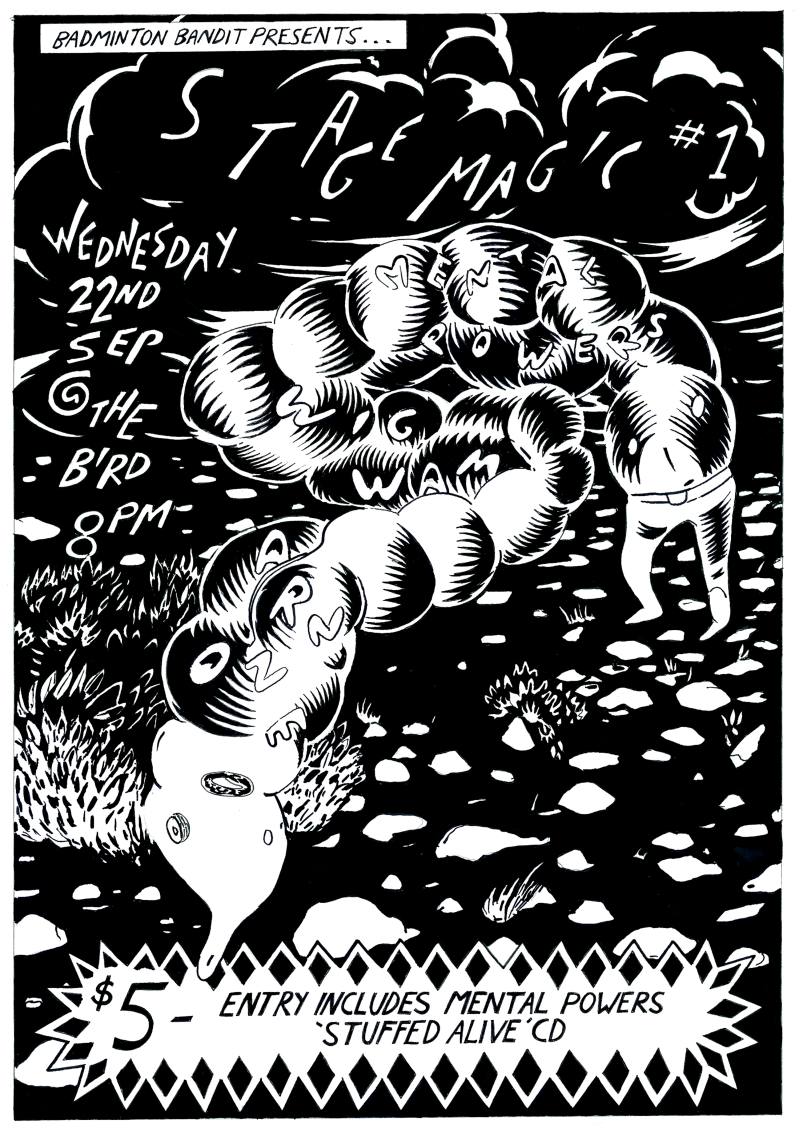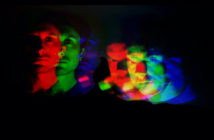Named after an apocryphal Italian breath mint with a strong aniseed aftertaste, Mental Powers are starting to make ripples in the wider musical universe outside of their adopted home of Perth. Mental Powers are the sound of creaky engines, human breath and inspiration, distilled and translated through the venerable art-rock canon. Taking equal inspiration from Star Trek, This Heat, the Tour de France and house parties, the four-piece are engaged in an impromptu dissection of the creative process via a rotating percussion-driven line up, shared experiences, and a somewhat hermetic approach to musicality.
Coming together in a typically organic manner, Mental Powers were born out of the ashes of Microwaves, an outfit assembled for a friend’s birthday party in 2005, a scene that surely repeats, as long as humans feel the need to gather in order to play instruments and celebrate birthdays. The Clash may have declared “No Elvis, Beatles or the Rolling Stones in 1977″ during Punk’s supposed Year Zero, but for Mental Powers in modern-day Perth, “we have no reference points. It tends to be a clash between noisy, fast, aggressive music or soft vibes and nice melodies that we can relax into and develop slowly,” according to keyboard player Tom Freeman, “Mental Powers is a meeting ground for our tastes.”
Mental Powers can be a captivating experience. When the mood is right and the audience appreciative, being invited into their sound world is a rewarding proposition. Witnessing their support for Sun Araw in October last year was as close to transformative as I have witnessed in quite some time, and still sticks in my mind as one of the live experiences of 2010. Mental Powers appeared on the stage without fanfare, sitting cross-legged and self-contained. They proceeded to mold a delicate, slowly morphing atmosphere that was endlessly captivating to those audience members that resonated with the vibe. On this night, the crowd got to see the more subdued side of Mental Powers, but weeks earlier they created a propulsive, ever-changing percussion lead onslaught to honour the launch of their Stuffed Alive CD.
Whereas an artist like Sun Araw could be typified as inhabiting the one musical neighbourhood, shifting his palate subtly with effects and instrumentation to bring about endless variations on a similar theme, Mental Powers’ music tends towards a greater dynamic range. Constructing songs comes about through improvisational jamming at rehearsals, and then deciding what parts to keep and develop. Drummer Jamie Doohan perceives that “what usually happens is that we have an idea, some sort of sound, and we play that throughout the year. If anyone has seen us over the course of the year, the track might start out a certain way, but by the end of the year, the instrumentation will have completely switched. The emphasis may shift, but the actual germ of the idea has gone through all these different mutations.”
Jamie continues,“I always think that when we play live, that it is sort of like a progress report on where the next thing will go. For me, there’s a structure, sometimes it’s loose, sometimes it’s pretty tight, but we usually know our cues and where we are going with it. We might have a destination in mind – it’s not like a loose improvisation, there are usually a lot of signposts along the way. It’s important to have a structure for dynamics. I like the idea of dynamics, I like the fact that we can be super-loose or super-tight, if we need to be.”
Although they were born out of a scene where bands played house parties as a way to gain experience and exposure (indeed, Jamie lived in a West Perth share house legendary for its living room gigs), Mental Powers are at pains to point out that they do not subscribe to a hierarchy of scenesters. There’s definitely an under-current of this in Perth, and with the isolation inherent in the locale, it can be a challenge for perceived outsiders to break into certain areas. Maybe Mental Powers are just of an age where the cliquey nature of scenes can be firmly put in its place? “As long as the bands we are playing with are putting stuff out that kind of goes out on a limb, pushing it and relishing that challenge,” says Deni, it’s kind of difficult to play live with people, exciting and terrifying at the same time. Just being in that moment – bands that aren’t trying to pose or pretend or be something that they’re not. Not necessarily immediate music, just being real honest.” There’s a hint of the hive-mind at work in Mental Powers, as Tom responds by email, “Perth’s been a great place for us, with heaps going on in terms of similar bands and having things to listen to and join in on, although, this seems common both nationally and internationally. I don’t know where we sit within it, but it’s good. I wish we had more time to contribute and being [sic]more involved!”
Thanks to their previous releases on local labels Fifth Column and Badminton Bandit, the Mental Powers sound is starting to permeate the airwaves, blogosphere and consciousness outside of their immediate circle of friends and bands that they have played with. For Tom, “the recordings we’ve released are only snippets of Mental Powers and our activities. They’re moments that we’ve focused on and put work into to produce a packaged thing. I don’t feel as if any of the releases are perfect, but I appreciate that they capture that time, plus they need to be finished at some point!”
Their first release was an obscenely short-run CDR given out to friends, while their first official release was a split 7″ with Jarrod Zlatic’s Free Choice outfit. Deni, who plays the alto saxophone, plus keyboards, percussion and vocal duties, met half of Fabulous Diamonds through Microwaves band-mate Clare, after catching Jarrod’s previous band Oh Belgium play in Collingwood. “This was before he had started Fabulous Diamonds, and Free Choice wasn’t even in the picture then, but I’d made contact with him. A few years went by, Mental Powers played with Fabulous Diamonds when they visited Perth the first time, and Jarrod was really excited by what he heard, he wondered if we wanted to do a split 7â€Â. A mutual friend, James from Fifth Column, was willing to pony up the dough and put it out. We decided to record something new for that release, Jamie did the drawing for the cover.”
Chronologically, the three-track Untitled EP on Badminton Bandit was released before, but recorded after, the material that makes up Stuffed Alive. This EP is a perfect primer to the world of Mental Powers, with hand-screened individual artwork by Jamie, unique packaging (of a size and shape that stands out from the bulk of CDs) and a sound that is at once aggressive, hypnotic and dynamic. It’s not a release that is immediate in its effect, the labyrinthine layers and nuances contained within demand repeated listens and full attention. For Deni, “things that I like straight away, I might only like for a short time. Things that I don’t get straight away, they kind of grow on me, reveal themselves over a longer period of time. It’s like your mind has to catch up to the sound. Maybe you didn’t know that you’d like it, but you kind of had to invest some time.”
Jamie continues the theme; “Sometimes you might listen to something and you’ll discover the nuances later, get into it more, find out something more about it. I always feel that way about music, books and art; sometimes it’s just the right time to be listening to something, and at other times, it’s not where you are. I often find that when lots of people say “You should listen to this, this is the best, I’m usually turned off by that, but then two or three years down the track I might discover it I’m way behind the times, my new release section is like five years old! I get into things, an author for example, and I might try and read it and I’m like “No, I’m just not into this at the moment”. A couple of years down the track, I might totally understand this, and I’m totally getting the vibe of where they are heading.”
Stuffed Alive, released in September 2010, features live recordings of the band captured between 2007-10. “I like the idea of remixes, reworking songs continually so that stuff may be released again in a transformed guise,” says Tom. “That’s how Stuffed Alive came about, we got to play about with a big mass of recordings, trying things that weren’t sticking to the original idea that we might have had for these songs.”There’s a tension permeating the marrow of Stuffed Alive, almost as if one can sense the razors edge of raw performance being usurped by studio reconstruction, splicing version after version into the mix. Jamie’s take is somewhat more prosaic, “in a way, the Stuffed Alive thing was a bit of a stop-gap, and that’s not meaning to dismiss it. It was released between the Untitled EP and the new 12″ we are working on. I guess we couldn’t be arsed re-recording the tracks and we had all these hours of tapes. We did go for different takes of things that people might not have heard, there is [sic]a lot of acoustic sounding elements on Stuffed Alive that are different from our typical live approach. We tried to do something that was a bit fresh.”
The percussive elements of Mental Powers contribute greatly to the overall sound and energy of the band. Especially on Stuffed Alive and in the live arena, the Mental Powers drums are bolstered by percussion, wielded by various members, as the need arises. “Well, it’s the first instrument that anyone learns to play, isn’t it? You’ve just got to be able to keep in time.” Jamie explains the drum sound further, “Lew plays a Steel Drum, which is contact miked, but it’s not like a conventional Steel Drum kind of sound, how he’s got it set up. I’ve played the inside of washing machines and other random stuff and contact miked these. That’s what you hear on Stuffed Alive, plus I use a lot of rims, like mishits, and my kit has two snare drums.”
A significant portion of the Mental Powers sound summons up the ghost of influential UK post-punk outfit, This Heat. “The whole This Heat thing, I’m not naive but I probably came across This Heat two and a half years ago, and I really liked what they were doing,” says Jamie “but, I don’t think we are trying to self-consciously replicate any of that kind of stuff. If we share anything with This Heat, it would be in a sense of ethos. They really went out on a limb with what they were doing, and there’s something almost hermetic about the way they recorded and approached their music. You couldn’t really get much more hermetic than in an old cold-storage facility in Brixton. We do ours in a quarantine chamber in Inglewood, we have to wear special suits so that the germs don’t spread! I probably get into Charles Hayward’s solo stuff more, although he is predominantly known as a drummer, I just like him as a lyricist. As much as I love This Heat, I think that the other stuff is a bit overlooked. I don’t think we try to tap into anything, although I guess we kind-of do, by default.”
Deni takes up on the theme, “we aren’t like genre-philes in that way. As a band, the rules are, if you’ve got something that’s interesting, bring it to the table, and we’ll try to work it in somehow. I saw an interview with Frank Zappa once (he obviously knows how to play, though), and he was grappling with the challenge of bringing in a Hawaiian guitar part and make it work in the context of rock n’ roll music, played with rock n’ roll instruments. We have a similar kind of aesthetic.”
The band undertook their first tour on the Eastern Seaboard in late February, in support of their forthcoming 12″ on Badminton Bandit towards the end of March. The new release, entitled Homoh, has been recorded entirely in house, as well as the artwork and all post-production. Being recorded in Jamie’s living room, he’s been witness to the musical goings on and experiments that have gone into the recording of Homoh. “Currently, Lewis has also been making his own little music box things, which he’s been contact miking and then putting a few effects on,” says Jamie. “On Homoh you’re going to hear some pretty weird percussion / electronic kind of sounds, which are very ambiguous to their original source.”
Homoh is, in part, a reference to the lineage of the human genus, reaching out from the mists of time inhabited by Homo habilis, through to Homo sapiens sapiens, our modern, tweeting variety of consumers. Clocking in at around 35 minutes, the tracks are all related to the body, and specifically invented body parts dreamt up by the band. Slated for release in March, according to the band, “people are going to be confused.” Possibly by the ambiguity of the title, which is also a palindrome, as much as by the musical ideas contained within.
As the Western Australia mineral resources bonanza ramps up again, saving the country from an inevitable slide into recession and indolence (at least according to the local papers), the crawl space available for people to eke out a living on the supposed margins of society takes another battering. Mental Powers exist in an atmosphere where creative people are being pushed hard to maintain the pursuit of their unique muse. It is not too much of a stretch of the imagination to summon up a near future where many creative pursuits are perceived as valueless in the onslaught of free Internet availability and a seemingly all-pervasive Bogan Bacchanalia, here’s to Mental Powers being an antidote to, or a refuge from this bleak future.
Homoh is released on Badminton Bandit. Mystery Meats, a compilation of flyers by Jamie Doohan, is a book released by Badminton Bandit in December 2010.






